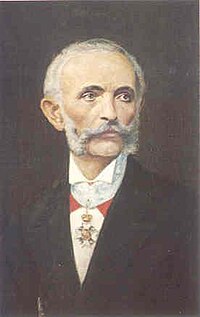Konstantinos Zappas

Konstantinos Zappas (Template:Lang-el; 1814–1892) was a Greek entrepreneur and national benefactor. Together with his cousin Evangelos Zappas, he played an essential role in the revival of the Olympic Games.[1]
Zappas was born into an Aromanian family.[2] in 1814 in the village of Labova e Madhe (Mega Lambovo), between Gjirokastër (Argyrokastro) and Tepelenë, in today's Albania, then in the Ottoman Empire. After the death of Evangelis Zappas he became the executor of his cousin’s legacy and the ongoing revival of the Olympic Games. He was appointed manager of the Olympic Committee that organised the so-called Zappas Olympics, a Greek athletic festival held in 1859, 1870 and 1875 and forerunner of the modern international Olympics.
In 1881, after the annexation of Thessaly to Greece, he bought extended estates there and the following years contributed to the building of the Zappeion building in Athens, which was officially opened on 28 October 1888. Moreover, a number of Greek schools and educational facilities were built with his personal financial support including the female schools in Constantinople,[3] in his hometown Labovë, as well as in a number of towns in Epirus (Tepelene, Delvine) and Thessaly. Many students benefited from his scholarship for post-graduate studies in Western Europe (mostly in the scientific field of agriculture).
He died in 1892 in Mantes-la-Jolie, France. On his death the Romanian government seized all of his assets and capital that were still in Romania causing a noted international law case at that time and his cousin Evangelis Zappas was often incorrectly cited as his brother. There was also land and money in Greece that Konstantinos left to the Greek government. Baron Pierre de Coubertin together with A. Mercatis, a close friend of Konstantinos, encouraged the Greek government to put in some of that legacy to fund the 1896 Athens Olympic Games in addition to the legacy of Evangelis Zappas.[4]
The statues of Konstantinos and his cousin Evangelis Zappas are situated in front of the Zappeion.
References
Citations
- ^ Rühl 2004, pp. 3–16.
- ^ Jovanovski, Dalibor; Minov, Nikola (2017). "Ioannis Kolettis. The Vlach from the ruling elite of Greece". Balcanica Posnaniensia. 24 (1). Adam Mickiewicz University in Poznań: 222–223. ISSN 2450-3177. Retrieved 8 May 2017.
{{cite journal}}: Invalid|ref=harv(help) - ^ Ruches 1967.
- ^ Young 1996, p. 117; Martens 1893; Streit 1894.
Sources
- Martens, Fedor Fedorovich (1893). Memoire sur le conflit entre la Grece et la Roumanie concernant l'affaire Zappa (in French). Athens.
{{cite book}}: Invalid|ref=harv(help)CS1 maint: location missing publisher (link) - Ruches, Pyrrhus J. (1967). Albanian Historical Folksongs, 1716–1943: A Survey of Oral Epic Poetry from Southern Albania, with Original Texts. Chicago, IL: Argonaut Incorporated.
{{cite book}}: Invalid|ref=harv(help) - Rühl, Joachim K. (2004). "Olympic Games Before Coubertin". In Findling, John E.; Pelle, Kimberly D. (eds.). Encyclopedia of the Modern Olympic Movement. Westport, CT: Greenwood Publishing Group. pp. 3–16. ISBN 978-0-313-32278-5.
{{cite book}}: Invalid|ref=harv(help) - Streit, Georges (1894). L'affaire Zappa: Conflit Gréco-Roumain (in French). Paris: L. Larose.
{{cite book}}: Invalid|ref=harv(help) - Young, David C. (1996). The Modern Olympics - A Struggle for Revival. Baltimore, MD: Johns Hopkins University Press. ISBN 0-8018-5374-5.
{{cite book}}: Invalid|ref=harv(help)
